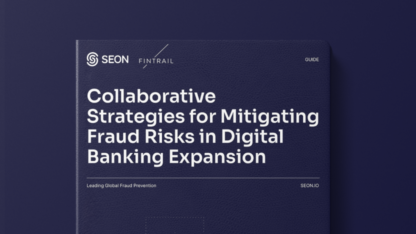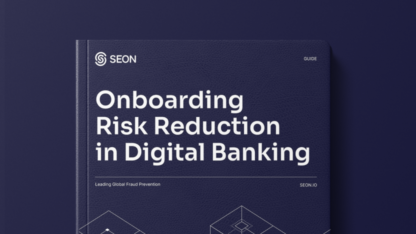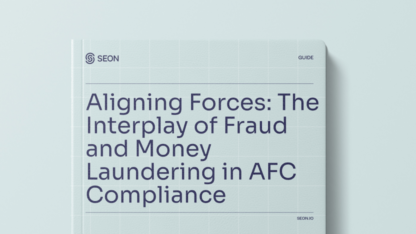Episode seven of the SEON podcast features Janis Tjarve, Portfolio Credit Risk Manager at Sun Finance. Janis shares his thoughts on the fintech industry and how to get started in fraud prevention.
We’ve already covered some of Sun Finance’s fraud challenges, including how the online lender leverages social media profiling to underwrite risk. But today, we’re talking to Janis Tjarve, Portfolio Credit Risk Manager at the company, to understand a bit more about their day-to-day activities.
His daily workload involves fighting credit risk, mostly by tailoring risk rules and overseeing their automated processes. But his position also crosses over with product development, marketing, and upper management, which is why he had some great insights to share about the general fintech world.
A Scientific Mindset is a Must-Have
Before joining Sun Finance, Janis was an engineer, data scientist, analyst and consultant for Deloitte. And he’s fairly confident that his methodical approach to problem-solving helps him understand and fight risk, and that it’s a must-have in the industry:
“The way I see it, it’s very good to have a structured approach to anything we do. This scientific background really helps me and my colleagues with a similar background. We have quite a lot of people with heavy maths and statistics backgrounds in our team as well.”
Interestingly, there is no shortage of talent in the Baltics with those skills, where Sun Finance’s headquarters are located.
I think the whole Baltics region has an inbuilt background skewed towards all these hard skills like maths and statistics. I guess this is a heritage from the USSR where that was a major focus point of everyone’s education. – Janis Tjarve Share on XIt’s certainly something we agree with at SEON, running our company from a non-traditional startup hub.
But These Skills Can Also Be Hard to Apply in the Real World
Unfortunately, fraudsters don’t operate in a controlled environment. Risk management is chaotic by nature, simply because fraudsters are adaptive, and they have time on their side. As Janis puts it:
“Where scientific mindset doesn’t help is with professionalism. You want to do everything right, you want to be the best, build the best models and so on. Which would be great in a perfect world, but we’re very limited by time. So we have to focus on where we can gain the most with the least amount of time invested.”
And It’s Primordial to Keep an Eye on the Bigger Picture…
Janis continued on the theme of everyday obstacles when it comes to risk management:
“With the huge amount of data we have at our disposal, it’s very easy to get carried away. You can spend hours and days just digging into features looking for the perfect clients where no one is defaulting, no one is asking for more months to repay… You can spend humongous amounts of time researching those customers.”
This is, where Janis believes, it’s important for fraud managers to get a better view of the entire business process.
“What helped me partially is my latest education in project management. You have to have a plan, and you have to have a plan with a set deadline.”
This 360 view of the company and its operations is what makes the difference between a good fraud manager and a great one.
…Especially Since the Fintech World is So Fast-Paced
When asked about the differences between loans from traditional banks and fintechs, Janis quickly points to the speed at which they do business, and the volume of data they must process:
“It’s a completely different playing field. [in fintech] the speed at which you jump in and you have to learn is much higher than in traditional banking. Maybe now, in the Baltics the banks have started to catch up and are investing huge resources to drive their data function as well.”
Still, working in fintech has its advantages when it comes to testing and tweaking their models.
“The structure in banks is much heavier, so [at Sun Finance] if I have an idea and want to implement it, I have 5 people with whom I need to discuss it to get approval. But in banking, I don’t want to diss anyone, but it would be quite a lot longer. Much more cumbersome than in fintechs.”
Still, Automation can Backfire If You’re Not Careful.
Even a fully online lending platform like Sun Finance needs to count on its talent:
“The whole thing with fintech is that the process is automated. So you don’t need an army of agents or customer specialists that are reviewing the application. But that’s also a risk in itself, because if something in the automatic system goes wrong, well, you are in big trouble.”
Key Takeaways
The fintech world is evolving so fast, it’s always great to catch up on how things operate behind the scenes.
And while automation is an integral part of what makes Sun Finance successful, it’s certainly fascinating to see that they are aware of the risk a fully-automated system can incur.
At SEON, we’ve always believed machine learning (ML) and artificial intelligence (AI), are only as efficient as the people who leverage them. You do need a combination of computer power and human intelligence to reduce risk, which is what Sun Finance strives to do to scale safely.
You might also be interested in reading about:
- SEON: PSD2 Compliance
- SEON: Risk Management: KPIs Vs KRIs (Key Risk Indicators)
- SEON: Buy Now Pay Later Fraud
- SEON: Online Lending Fraud: Software Solutions
- SEON: Best Banking Fraud Detection Software
Learn more about:
Data Enrichment | Browser Fingerprinting | Device Fingerprinting | Fraud Detection API








